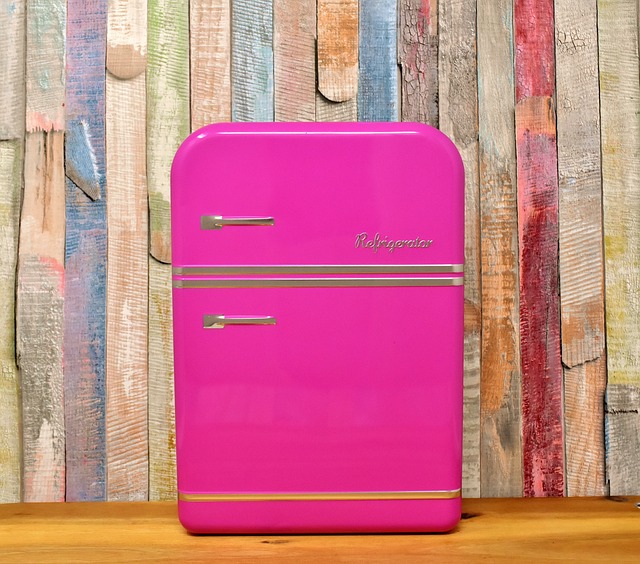When your refrigerator starts making unusual sounds beyond its typical hum, it's an indication that you should conduct a prompt diagnostic check. These sounds can range from grinding, hissing, or banging, which may point to issues like faulty door seals, evaporator fan motor malfunctions, misaligned condenser fan blades, or refrigerant leaks, all of which might necessitate professional intervention for proper repair. The article emphasizes the importance of early detection to prevent more extensive repairs and maintain food safety. It also suggests that regular maintenance can help avoid these complications, extending your refrigerator's life and optimizing its performance. If you encounter complex problems like a compressor malfunction, characterized by a whirring sound alongside reduced cooling efficiency, it's advisable to consult with a qualified technician. For routine maintenance, consider cleaning the condenser coils, inspecting door seals, and tightening any loose hardware to minimize vibrations and maintain your refrigerator's quiet and energy-efficient operation. Addressing these issues promptly can prevent more serious problems and costly repairs, ensuring your food remains fresh and your appliance functions optimally.
When your refrigerator starts making odd noises, it can be a cause for concern or simply an unfamiliar aspect of your appliance’s operation. Understanding the origins of these sounds is crucial for maintaining your fridge’s efficiency and longevity. This article delves into the common causes behind refrigerator repair needs, offering a comprehensive guide to identifying unusual sounds, a step-by-step diagnosis to pinpoint the source, and professional tips on when to seek expert assistance for refrigerator repair. Additionally, we’ll explore maintenance best practices to ensure your appliance operates quietly and effectively. With the right knowledge, you can address these issues promptly and keep your fridge in optimal condition.
- Identifying Unusual Sounds from Your Fridge: A Guide to Troubleshooting
- Common Causes Behind Refrigerator Repair Needs: Understanding the Noises
- Step-by-Step Diagnosis: How to Pinpoint the Source of Strange Refrigerator Sounds
- Professional Tips for Silencing Your Fridge: When to Call a Refrigerator Repair Specialist
- Maintenance Best Practices to Keep Your Refrigerator Quiet and Efficient
Identifying Unusual Sounds from Your Fridge: A Guide to Troubleshooting

When your refrigerator begins to emit sounds that fall outside its usual operational hum, it’s time for a diagnostic check. Unusual noises such as grinding, hissing, or banging can indicate underlying issues requiring attention. To pinpoint the source of these sounds, start by identifying the specific area where the noise is originating. A gentle thump or clunk might signify that the door seal needs adjustment or replacement, which can prevent cool air from escaping and optimize your refrigerator’s energy efficiency. If you hear a sound similar to crackling ice or popping bubble wrap, this could be the evaporator fan motor at work, though it’s advisable to have this verified by a professional as it may also suggest a refrigerant leak. A consistent hum from the condenser fan is expected but a change in pitch or frequency might mean the fan blades are misaligned or obstructed. These noises can be a precursor to more significant refrigerator repair needs, so it’s crucial to address them promptly. For instance, a whirring sound accompanied by a lack of cooling could indicate a malfunctioning compressor. In such cases, consulting with a qualified technician is essential to avoid further damage and ensure your food remains safely chilled. Regular maintenance and inspections can help prevent these issues from arising, extending the lifespan of your refrigerator and maintaining its performance.
Common Causes Behind Refrigerator Repair Needs: Understanding the Noises

When your refrigerator starts making odd noises, it’s a signal that something within the appliance may need attention. Common causes behind refrigerator repair needs often stem from the unit’s mechanical and electrical components. For instance, if you hear a buzzing or humming sound, it could indicate an issue with the compressor or the evaporator fan motor. These components are crucial for maintaining the cooling cycle, and any malfunction can disrupt their smooth operation, leading to these sounds. Another frequent noise is a clicking or clacking sound, which is usually associated with the ice maker or the defrost timer. These parts work in tandem to ensure the ice maker operates correctly, and when they fail or wear out, they can create these noises. Additionally, a grinding or squealing noise often points to issues with the fan motor or blades, suggesting potential friction or bearing problems that could escalate into more significant repairs if not addressed promptly. Understanding the nature of these sounds is essential for timely refrigerator repair; it allows homeowners to pinpoint the problem area and prevent further damage or inefficiency in their appliance. Regular maintenance and prompt attention to unusual noises can extend the lifespan of your refrigerator and ensure it continues to operate efficiently, keeping your food fresh and safe.
Step-by-Step Diagnosis: How to Pinpoint the Source of Strange Refrigerator Sounds

When your refrigerator starts making odd noises, it’s a sign that something within the appliance may need attention. To accurately diagnose and address the issue, a step-by-step approach is essential. Begin by identifying the noise and its timing; some sounds are normal, like the hum of the compressor or the click of the ice maker, while others might signal a problem. Start with the most accessible parts: listen for squeaks and groans coming from the door seals, hinges, or shelves. If these are not the source, check the condenser coils at the back or bottom of the fridge. They can become loose or dirty, leading to unusual vibrations or sounds.
If the noise persists, consider the cooling elements. The evaporator fan, located at the top rear of most refrigerators, can make a variety of sounds when it’s malfunctioning. A continuous humming might indicate an electric motor issue, while a rattling sound could mean the fan blades or motor mounts are loose. To further diagnose, inspect the drain pan and drip tray for clogs, as water accumulation can cause strange gurgling or bubbling sounds. Finally, if you suspect the compressor, listen for changes in pitch or rhythm; irregular operation here is a common sign of refrigerator repair needs. With each step, narrow down the potential sources until you can confidently determine what part of your refrigerator requires attention.
Professional Tips for Silencing Your Fridge: When to Call a Refrigerator Repair Specialist

When your refrigerator starts making unusual noises, it’s natural to wonder about the cause and whether it’s something you can address yourself or if it’s time to call in a professional. If you’ve noticed odd sounds like grinding, humming, or squeaking that are out of the ordinary for your appliance, here are some steps to diagnose and potentially resolve the issue. Begin by checking the source of the noise. Isolate the fridge and listen carefully; this can help pinpoint where the sound is originating from. Common culprits include a fan motor humming due to wear or an evaporator fan that’s loose or failing. If you’re comfortable with the appliance’s design and have basic troubleshooting skills, you might be able to tighten a loose part or clean debris from a condenser fan. However, if your investigation leads you to components like the compressor or if you’re unsure about proceeding safely, it’s advisable to consult a refrigerator repair specialist. These professionals are trained to handle such repairs and can quickly identify whether the noise is indicative of a minor issue or a more serious problem that could potentially lead to a fridge malfunction or breakdown. Remember, attempting complex repairs without expertise can void warranties and potentially cause further damage. Therefore, when in doubt, reaching out to a qualified refrigerator repair specialist is the best course of action to ensure your appliance operates quietly and efficiently, thus maintaining its longevity and performance.
Maintenance Best Practices to Keep Your Refrigerator Quiet and Efficient

When your refrigerator starts making odd noises, it’s a signal that maintenance is required to keep it quiet and efficient. Regular upkeep can prevent many issues from arising, ensuring your appliance operates smoothly. Begin by cleaning the coils, typically found at the back or bottom of the unit. Dust and pet hair can accumulate here, causing the compressor to work harder and make more noise. Use a coil brush or vacuum cleaner with a crevice tool to remove this buildup. Check the door seals, also known as gaskets, for any warping or brittleness that might cause them to not seal properly, leading to refrigerant escaping and the unit working overtime. If you notice gaps when closing the door, it’s time to replace the seals to maintain optimal performance.
To further ensure your refrigerator remains quiet and energy-efficient, inspect the mounting hardware regularly. Loose screws or bolts can cause vibrations that result in unusual sounds. Tighten any fasteners as needed, making sure the fridge is level to prevent any unnecessary shaking. If you’re experiencing a consistent hum or buzz that has recently started, it could indicate a failing compressor or fan motor. In such cases, consulting a professional for refrigerator repair is advisable. They can diagnose and address the issue before it escalates, potentially saving you from costly repairs down the line. Keeping your refrigerator clean, level, and properly sealed not only extends its lifespan but also keeps it running quietly and efficiently, ensuring your food stays fresh without disturbing noise.
When your refrigerator begins to emit a symphony of odd noises, it’s natural to take notice. Understanding these sounds is key to maintaining your appliance’s efficiency and longevity. This article has provided a comprehensive guide on identifying unusual sounds from your fridge, pinpointing their causes, and offering solutions to address them effectively. From the routine maintenance that can prevent issues to recognizing when professional refrigerator repair services are necessary, the information presented aims to empower homeowners with the knowledge to handle these occurrences confidently. Remember, minor sounds can often be resolved with a few adjustments or cleanings, but more persistent or unusual noises warrant prompt attention from a specialist in refrigerator repair. Adhering to maintenance best practices will help keep your fridge quiet and operating at peak performance. With these insights, you’re now equipped to tackle unexpected sounds from your refrigerator with ease.
